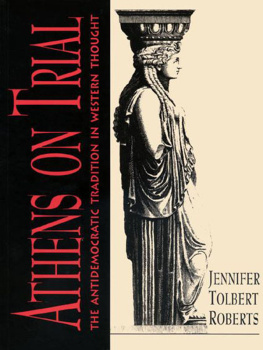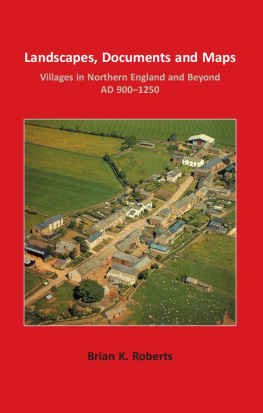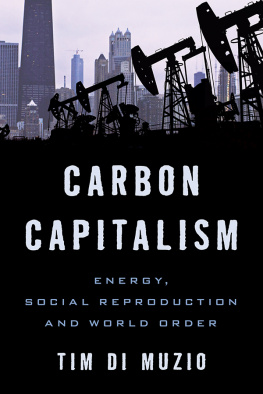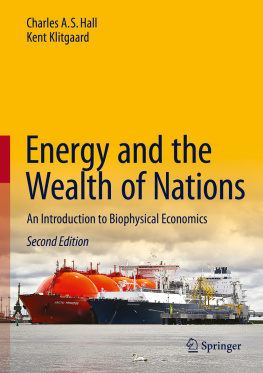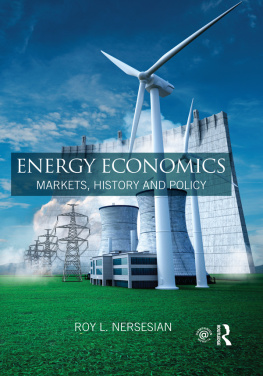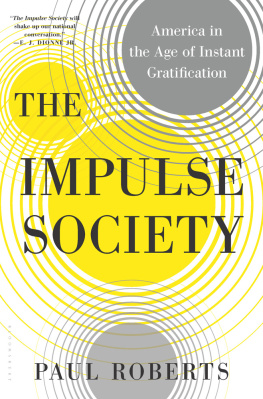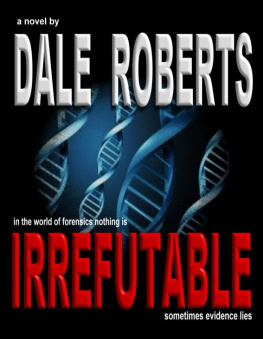H OUGHTON M IFFLIN C OMPANY
BOSTON NEW YORK 2004
Copyright 2004 by Paul Roberts
All rights reserved
For information about permission to reproduce selections from
this book, write to Permissions, Houghton Mifflin Company,
215 Park Avenue South, New York, New York 10003.
Visit our Web site: www.houghtonmifflinbooks.com.
ISBN -13: 978-0-618-23977-1
ISBN -10: 0-618-23977-4
Library of Congress Cataloging-in-Publication Data
Roberts, Paul.
The end of oil : on the edge of a perilous new world / Paul Roberts.
p. cm.
ISBN 0-618 23977-4
1. Petroleum industry and tradeGovernment policy. 2. Petroleum industry and trade
Government policyUnited States. 3. Energy policy. 4. Energy policyUnited States.
5. Petroleum industry and tradePolitical aspects. 6. World politics21st century
Forecasting. I. Title.
HD 9650.6 R 63 2004
333.79dc22 2004042718
Printed in the United States of America
QUM 10 9 8 7 6 5 4 3 2 1
F OR K AREN
Contents
Prologue
P ART I: T HE F REE R IDE
1 Lighting the Fire
2 The Last of the Easy Oil
3 The Future's So Bright
4 Energy Is Power
5 Too Hot
P ART II: O N THE R OAD TO N OWHERE
6 Give the People What They Want
7 Big Oil Gets Anxious
8 And Now for Something Completely Different
9 Less Is More
P ART III: I NTO THE B LUE
10 Energy Security
11 The Invisible Hand
12 Digging In Our Heels
13 How Do We Get There?
Notes
Bibliography
Acknowledgments
Index
Prologue
I WAS STANDING on a sand dune in Saudi Arabia's "Empty Quarter," the vast, rust-red desert where one-quarter of the world's oil is found, when I lost my faith in the modern energy economy. It was after sundown and the sky was dark blue and the sand still warm to the touch. My Saudi hosts had just finished showing me around the colossal oil city they'd built atop an oil field called Shayba. Engineers and technicians, they were rattling off production statistics with all the bravado of proud parents, telling me how many hundreds of thousands of barrels Shayba produced every day, and how light and sweet and sought-after the oil was. Saudi oilmen are usually a taciturn bunch, guarding their data like state secrets. But this was post 9/11 and Riyadh, in full glasnost mode, was wooing Western journalists and trying to restore the Saudis' image as dependable long-term suppliers of energynot suicidal fanatics or terrorist financiers. And it was working. I'd arrived in the kingdom filled with doubts about a global energy order based on a finite and problematic substanceoil. As we'd toured Shayba in a spotless white GMC Yukon, though, my hosts plying me with facts and figures on the world's most powerful oil enterprise, my worries faded. I'd begun to feel giddy and smug, as if I had been allowed to peek into the garden of the energy gods and found it overflowing with bounty.
Then the illusion slipped. On a whim, I asked my hosts about another, older oil field, some three hundred miles to the northwest, called Ghawar. Ghawar is the largest field ever discovered. Tapped by American engineers in 1953, its deep sandstone reservoirs at one time had held perhaps a seventh of the world's known oil reserves, and its wells produced six million barrels of oil a dayor roughly one of every twelve barrels of crude consumed on earth. In the iconography of oil, Ghawar is the eternal mother, the mythical giant that makes most other fields look puny and mortal. My hosts smiled politely, yet looked faintly annoyednot, it seemed, because I was asking inappropriate questions, but because, probably for the thousandth time, Ghawar had stolen the limelight. Like engineers anywhere, these men took an intense pride in their own work and could not resist a few jabs at a rival operation. Pointing to the sand at our feet, one engineer boasted that Shayba was "self-pressurized"its subterranean reservoirs were under such great natural pressure that, once they were pierced by the drill, the oil simply flowed out like a black fountain. "At Ghawar," he said, "they have to inject water into the field to force the oil out." By contrast, he continued, Shayba's oil contained only trace amounts of water. At Ghawar, the engineer said, the "water cut" was 30 percent.
The hairs on the back of my neck stood up. Ghawar's water injections were hardly news, but a 30 percent water cut, if true, was startling. Most new oil fields produce almost pure oil, or oil mixed with natural gaswith little water. Over time, however, as the oil is drawn out, operators must replace it with water, to keep the oil flowinguntil eventually what flows from the well is almost pure water and the field is no longer worth operating. Ghawar wouldn't run dry overnight: depletion takes years and even decades; however, daily production would continue to fall steadily, and the Saudis would be forced to tap new fields, like Shayba, to maintain their status as the world's preeminent oil power. While such expansions were never a problem during the heyday of Arab oil wealth in the 1970s and early '80s, times are much tighter today for Saudi Arabia and for most other petrostates. As we drove back toward the airstrip for my flight home, my hosts bombarding me with more facts and figures, I couldn't shake the feeling that the gods of energy might not be as powerful and eternal and confident as I had imagined.
***
To me, Ghawar is the perfect metaphor for what is happening to the larger energy economy, a geologic cautionary tale for a complacent world accustomed to reliable infusions of cheap energy. On the face of it, our energy economy is humming along like a perpetual-motion machine. Today, billions of people enjoy an unprecedented standard of living and nations float in rivers of wealth, in large part because, around the world, the energy industry has built an enormous network of oil wells, supertankers, pipelines, coal mines, power plants, transmission lines, cars, trucks, trains, and shipsa gigantic, marvelously intricate system that almost magically converts oil and its hydrocarbon cousins, natural gas and coal, into the heat, power, and mobility that animate modern civilization. For three hundred years, this man-made wonder has performed nearly flawlessly, transforming coal, oil, and natural gas (and in much of the world, a vast volume of wood, peat, and even animal dung) into economic and political powerand nurturing the belief that the surest way to still greater prosperity and stability was simple: find more oil, coal, and natural gas.
Yet, like Ghawar, our energy economy has hit a kind of peak of its own. Each year, the world demands more and more energy, with no end point in sight. And each year, it is more and more evident that the extraordinary machine we have built to supply that demand cannot sustain itself in its present form. Not a day goes by without some new disclosure, some new bit of headline evidence that our brilliant energy success comes at great costair pollution and toxic waste sites, blackouts and price spikes, fraud and corruption, and even war. The industrial-strength confidence that was a by-product of our global energy economy for most of the twentieth century has slowly been replaced by anxiety.
Although, like most consumers, I've been a casual student of this energy anxiety since it begancirca 1974, with the Arab oil embargoI began exploring the question in earnest during the boom years of the late 1990s. I was writing about America's bizarre and growing infatuation with that modern warhorse, the "sport-utility vehicle," or SUV, and its close cousin, the pickup truck. At first, the story seemed to be mainly about conspicuous consumption and automotive vanity and sheer stupidity, since very few of their owners actually took their hugely expensive SUVs off-road or loaded their pickup trucks with anything heavier than groceries or soccer balls. But the more I looked into it, the more I realized that the real story lay less in the vehicles themselves than in the oceans of oil they were burning.
Next page




